Windows 7 Performance Guide
by Ryan Smith and Gary Key on October 26, 2009 12:00 AM EST- Posted in
- Systems
Laptop Performance
With the different power and performance characteristics of a laptop (not to mention the battery!) we’re going to break out our laptop results from the rest of our desktop data.
If you have seen our OS Mobility Explored article, where we compared laptop usage across Windows and Linux, then you should have a pretty good idea of what you’re about to see. The following is a selection of the most relevant data from that article, using Gateway’s very similar Intel and AMD power laptops: the NV5807u and NV5214u respectively.

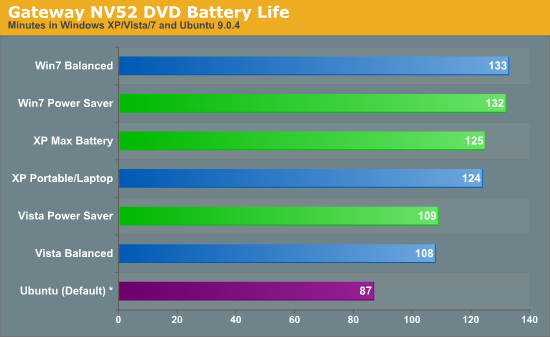
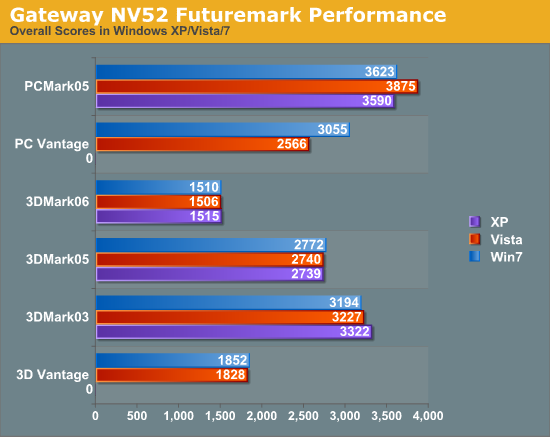
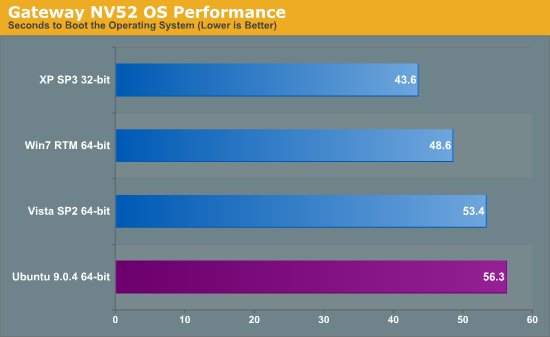
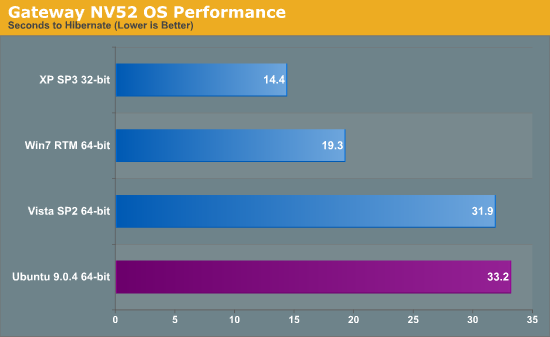
Starting with the NV52, our Athlon 64 X2 laptop, we see some immediate advantages for Windows 7. In terms of battery life it edges out Windows XP in all situations, and clearly surpasses Vista, particularly in DVD playback. As laptops have been one of Vista’s most troublesome areas, it’s here where Microsoft needed to see some real improvement, and they have delivered.
Meanwhile performance in our limited suite of benchmarks is largely tied. Vista wins in PCMark 05 only due to higher scores in the transparent windows test (something we suspect is a product of the WDDM 1.1 memory optimizations), XP takes 3DMark 03, and Win7 takes PCMark Vantage. Our tendency is to put more weight in to PCMark Vantage, since it’s quantifying the improved laptop performance that we’ve been experiencing, but aren’t necessarily seeing in other benchmarks.
Finally we have boot and hibernation times. Microsoft has been putting some effort in to bringing down the boot times of Vista, and it shows here, although XP is too tough to beat. Hibernation is a similar story – it’s easier to resume from hibernation when you have less stuff to load.
The NV52 paints what’s probably going to be the average picture for Windows 7 on laptops. It’s as fast (if not faster) than XP and can pull off a slightly better battery life, but it’s not going to be able to beat XP in booting/hibernating.
Next we have the NV58, our Intel C2D laptop.
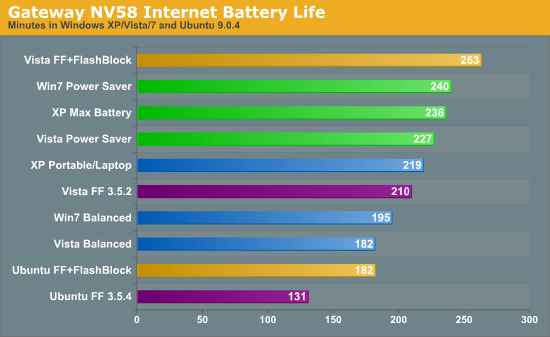
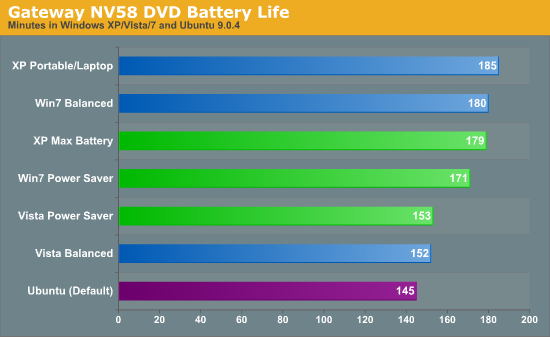
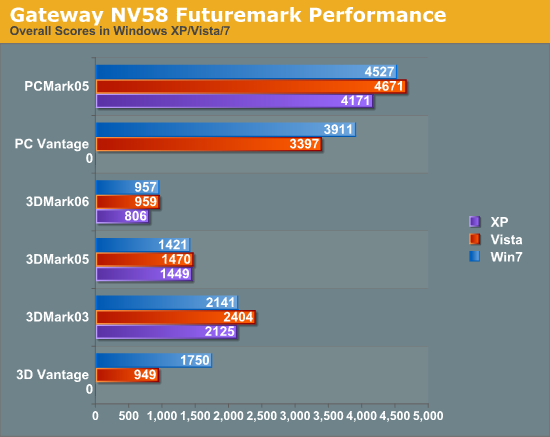
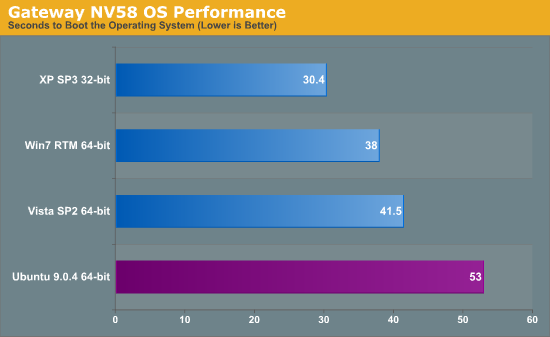
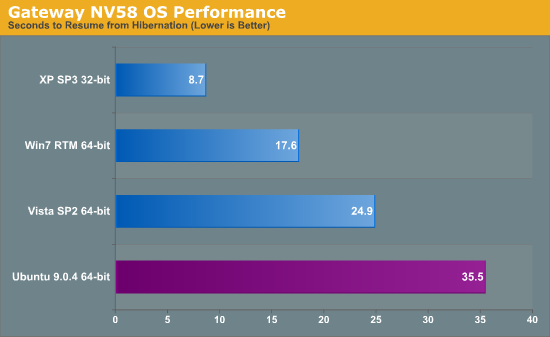
With battery life, we see some things similar to the AMD based NV52, and some things are different. Vista is still a loser, but Win7 doesn’t manage to build any kind of lead over XP in DVD playback, letting XP take it by a small margin. Battery life in our internet testing does go to Win7 however, once again with a small margin.
As for performance, we largely have the same results as with the NV52. Win7 wins PCMark Vantage, the test we care the most about, and pulls near-even elsewhere. 3DMark Vantage is an outlier this time, but this seems to be related to the Intel integrated graphics in this laptop.
Finally boot and hibernation times are similar to what we saw with the NV52. XP is still faster to boot and faster to return from hibernation, the benefit of an older, lighter-weight operating system. Win7 does handily beat Vista in all cases, however.










207 Comments
View All Comments
medi01 - Thursday, October 29, 2009 - link
I have 32-bit WinXP on PC and 32-bit Vista on notebook. I simply HATE the latter. No matter what I do, it takes longer. But I recall every new OS from microsoft was SIGNIFICALLY (tens of %) faster then the previous one (according to Microsoft ads) yet I never experienced it myself.So, why should I upgrade to Win7 again?
1) Because Win7 is slightly faster in some apps and slightly slower in others? (significally slower when hibernating)
2) New flishy-flashy effects?
3) Puzzling changes in UI, that, I guess, were supposed to make it "even more user friendly"?
4) DirectX 11? Oh, bundling those only with new OSes what a clever move.
And that for about 200$? Are you serious?
MrPete123 - Thursday, October 29, 2009 - link
Better battery life?Better security? (than XP)
Better stability?
Better performance?
Also the hibernate benchmark is skewed when you consider that 32-bit XP is storing less memory to the hard drive than 64-bit Vista/Win7. 32-bit XP only had to persist ~3 gigs of RAM to the hard drive, while 64-bit Win7/Vista had to persist the full 4 gigs. Hibernating speed is fairly similar in speed between XP and Win7. It would be a better comparison to either limit all machines to 2-3 gigs of RAM for the hibernating test, use 32-bit Vista/Win7 (yuck), or 64-bit XP.
medi01 - Friday, October 30, 2009 - link
Better battery life? Even if I would care about battery life, 200$? How much does spare battery pack cost?"Better" security? Huh?
"Better" stability, what's that? Does your XP/Vista crash? Well, mine doesn't. So, if I get resource hungry Win7 it will be "even stabler", huh?
Better performance? A few percent more where it doesn't matter much and huge performance hit, where it does (to me) - hibernate/wakeup?
Why would I care about internal details of who needs to persist what?
So to summarize
If you aren't a gamer who absolutely needs DX 11, you should find better ways to waste your 200$.
rs1 - Thursday, October 29, 2009 - link
And Homegroups. They puzzingly fail to even mention them in the article, but if you happen to have more than one computer, then Homegroups are awesome, and enough to justify the upgrade all by themselves, in my opinion.damianrobertjones - Thursday, October 29, 2009 - link
HEY ANAND!When are you going to run this story like you did for OSX the other month?
"Amazon's biggest-selling pre-order product of all time"
That would be Windows 7
lightzout - Friday, October 30, 2009 - link
Snow leopard sounds sexy. Windows 7 has the brand appeal of a pocket protector. That said I have to throw my vote in as a very satisied former XP champion. I swore I wouldn't leave XP which still seemed to work fine unless it was for a true upgrade. I am using the Win7 Ult64 RC and its pretty amazing. Example: I installed the analog Media Center Edition TV tuner from my MCE2005 box and hooked up a new DTA that comcast sent me (for free I might add) and when it booted I was worried because I didn't see the familiar "Found new hardware" dialog window. What happened? It was already installed and working. Comcast activated the DTA amd minutes later I realized why I stopped watching TV 10 years ago. 100 channels and nothing on worth watching! At least now I record the few things I do like and watch whenever I want streaming flawlessly through the Xbox 360. The MCE interface with Win7 and the 360 is really well done. Microsoft should have just picked a sexier name.jtleon - Wednesday, October 28, 2009 - link
I wish one of these review sites would compare FLP to 7 - across the board! Microsoft is keeping too many secrets! FLP is much newer than XP, and imho a superior OS to XP in all respects!jtleon
Voo - Wednesday, October 28, 2009 - link
Well only for old hardware.With modern desktop pcs or laptops (I'm not talking about netbooks here), there's no need to pass on the many features it lacks.. it doesn't even has a .NET 3.5 framework as far as I know.
That's far away from "a superior OS to XP in all respects!"
jtleon - Thursday, October 29, 2009 - link
.NET 3.5 is not supplied with XP - you must download it!jtleon
Voo - Thursday, October 29, 2009 - link
Afaik there's no .NET 3.5 framework that works with FLP - at least it was so some time ago and wikipedia agrees(well that's not the best source, but the first I found)